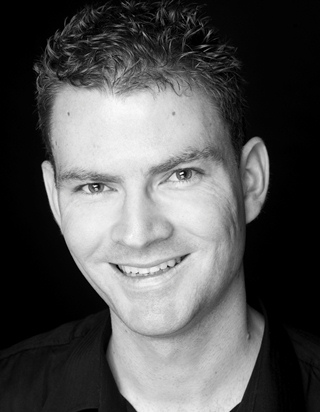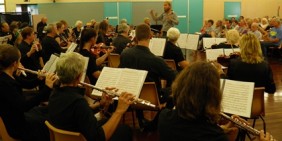
The String Contingent
by D L Lewis. Published in Music Forum magazine, Vol 19 Issue 3 (May 2013)
One of the great things that modern communications has brought us is how much quicker ideas meld and change and grow. While this may be overwhelming in close view, the recent spate of bands and performers who are able to seamlessly mix musical styles effectively is both heartening and exciting.
It wasn’t that long ago that music travelled through the trade routes, slowly developing and evolving until it was picked up by the academy, which standardised and formalised it. Now, with the internet, things develop faster and often more interestingly. The String Contingent, out of New South Wales but with a strong dollop of Scotland in there, follows in the footsteps of bands like Punch Brothers and Bela Fleck and the Flecktones in bringing folk, classical, jazz and contemporary pop together to make a satisfying and significant musical statement.
The National Cultural Policy: ‘Creative Australia’
EDITORIAL by Richard Letts. Published in Music Forum magazine, Vol 19 Issue 3 (May 2013)
So in mid-March, it was finally released, with money attached. Old news now, plenty of opinions expressed, even on the day of publication. It’s 144 dense pages long, and it needs a faster brain than your editor’s to give a judgement after a quick skim. An important Coalition figure was able to make a highly skilled judgement before it was actually available for a read: it would all be thrown out if the Coalition were elected.
That would be sheer bloody-mindedness. This is an impressive document and there were thoughtful contributions to it from over 400 people inside and even outside the cultural sphere. Rubbishing all that would be arrogant and destructive. Maybe there would be a few matters that do not fit Coalition priorities. Sure, make some amendments.
In praise of shades of grey…
 Personal reflections on my engagement with new music
Personal reflections on my engagement with new music
by John Davis. Published in Music Forum magazine, Vol 19 Issue 3 (May 2013)
I am fortunate to experience many kinds of new musics, and engage with creators and practitioners in a diverse range of contexts, both in Australia and internationally. Through the work we do at the Australian Music Centre, promoting the work of Australian composers, in the AMC’s role as the Australian Member Section of the International Society for Contemporary Music (ISCM) and in my role as the current President of the ISCM, I have a particular and privileged perspective on the new music landscape that few others have.
I stress, it is only one perspective, one perspective that is continually revising itself and evolving. There are many other perspectives that can offer alternate views which may be as valid as mine. In outlining some reflections, I feel compelled to highlight the complexities and nuances of what new music is, and how it operates and functions, which are so often over-simplified, and cosmeticized, and politically and aesthetically exploited, until they are devoid of any meaning. It is these complexities and nuances that I feel need to be fully embraced by anyone who recognises the critical importance of ‘the new’ in defining a future for music, beyond what is offered by the museum or popular culture.
Am I a musician, educator or entrepreneur? The short answer is yes.
by Luke Gilmour Published in Music Forum magazine, Vol 19 Issue 3 (May 2013)
 Yes, it is possible to earn a living, even have a career as a freelance school conductor. But Luke Gilmour’s research finds some ways that the situation could be improved – beginning with more relevant undergraduate education.
Yes, it is possible to earn a living, even have a career as a freelance school conductor. But Luke Gilmour’s research finds some ways that the situation could be improved – beginning with more relevant undergraduate education.
When deciding what to focus my attention on for my doctoral dissertation[i], I was drawn to investigate the world of freelance school conductors (FSCs) in NSW. My motivation was definitely autobiographical in nature, given that I had spent the last six years as a freelance conductor working in schools. The impetus for this project came from a desire to see if my journey was the same for everyone and an examination of what could be improved and how. What became apparent in the study is the need for peripatetic music educators (in this case conductors) to be multi-skilled in order to cope with the demands of constructing a career. Whilst the success factors of music performance and creative industry graduates have been examined extensively by Dawn Bennett[ii] and Ruth Bridgstock[iii] respectively, I wanted to take a closer look at my own sphere of freelance music education.
A Wild Time for Classical Music
by Greg Sandow. Published in Music Forum magazine, Vol 19 Issue 3 (May 2013)
 Everyone in the classical music sector in the US knows that they are living through turbulent times. Two things seem to be going on. First, massive problems for many mainstream classical music organizations, especially orchestras. And, second, the beginnings of large-scale change, which looks very hopeful. Veteran US critic and commentator Greg Sandow reports.
Everyone in the classical music sector in the US knows that they are living through turbulent times. Two things seem to be going on. First, massive problems for many mainstream classical music organizations, especially orchestras. And, second, the beginnings of large-scale change, which looks very hopeful. Veteran US critic and commentator Greg Sandow reports.
I’ll look at the problems first, and I’ll focus on orchestras, since they’re the hardest hit, and their problems have been the most publicized. What we’ve had, to put it bluntly, is the worst trouble in the past hundred years. In the past two seasons, things looked bad. Orchestras were running deficits. The Philadelphia Orchestra, one of our largest and most venerable orchestral institutions (if not our best managed), declared bankruptcy. The Syracuse Symphony and the New Mexico Symphony completely collapsed, and went out of business.
The Detroit Symphony nearly died. Its management said its operations weren’t sustainable, and said that musicians should take pay cuts, and should spend less time on the concert stage and more time in the Detroit community, in order to build support. The musicians hated these things, refusing, as they saw it, to accept changes that made them look like a second-rate orchestra. That led to a long labor dispute, during which musicians and management attacked each other publicly, and the orchestra didn’t perform.



















